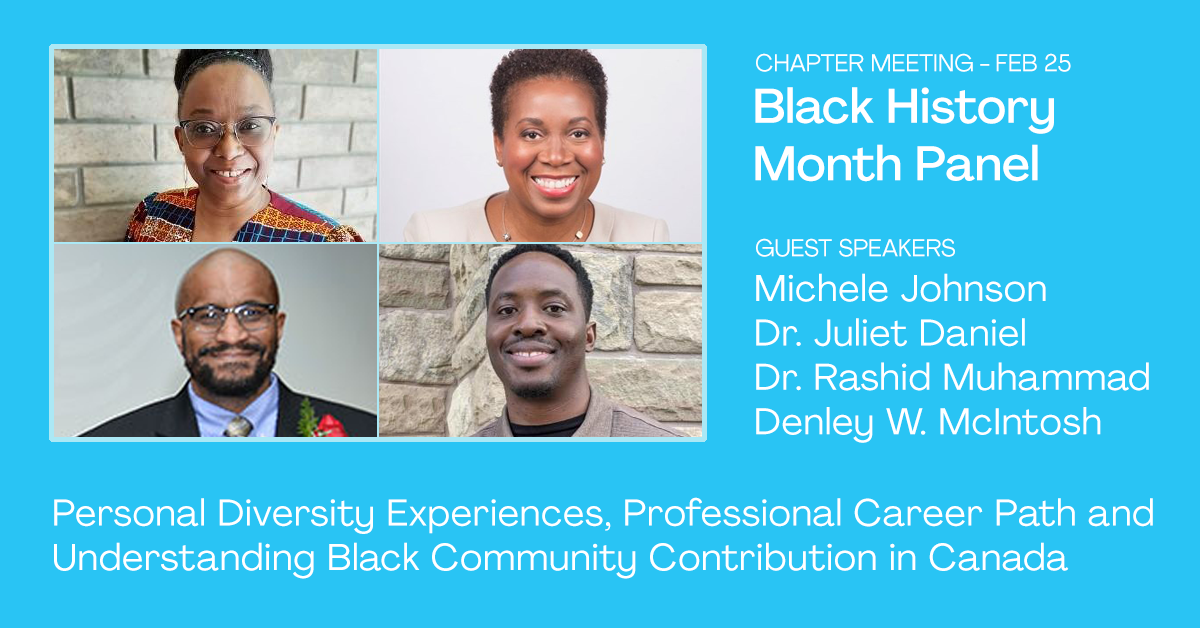18 March at 10:00AM
Acknowledging and Supporting the Black Experience - Black History Month Panel Recap
This past February, PMI Toronto marked Black History Month with an enlightening panel discussion that acknowledged the experiences, challenges, perseverance and successes of Black professionals within a Canadian context. Black History Month Panel: Personal Diversity Experiences, Professional Career Path and Understanding Black Community Contribution in Canada featured a panel of Black scholars and professionals who did not shy away from difficult conversations about historical and systemic enablers of racism, allyship and the detrimental and polarizing impact of failing to acknowledge and support diverse experiences.
Panelists included:
Denley W. McIntosh, CEO Renew IQ (moderator)
Dr. Juliet Daniel, Ph.D. Professor and Interim Associate Dean of Research & External Relations, McMaster University
Dr. Michelle Johnson, Ph.D. Associate Dean, Students, York University
Dr. Rashid Muhammad, Director of Operations for the Volunteer Legal Services Project

Acknowledging Racial Disparity in Science and Medicine
In her introduction, Dr. Daniel compellingly addressed racial disparity in science and medicine, stressing the need for diverse representation in clinical trials and the development of medical tests and treatment options.
Over the years, research continues to demonstrate that differences in genetic ancestry can cause our bodies to react differently to drugs or proteins affecting cell function. Consider the fact that skin pigmentation can influence how an oximeter measures oxygen levels – incorrectly skewing an important metric used for the monitoring of COVID-19 progression.

Through her own research into triple negative breast cancer, Dr. Daniel found a disproportionate number of instances and a much higher mortality rate for Black and Hispanic women, over their Caucasian counterparts. Despite these harrowing preliminary findings, when seeking grant funding to explore the possibility of a genetic or ancestral link, Dr. Daniel was initially declined funding and told that her work was not relevant to a Canadian environment. She would have to submit three times before her work was finally recognized – a perfect example of the barriers often faced by racialized professionals. This is sometimes referred to as the “Black Tax” - Black professionals having to go above and beyond (and above that) to get to the same level of their White-passing counterparts.
The Canadian Collective Amnesia
Dr. Johnson spoke to a collective amnesia that ignores an ideological framework that began in Canada as early as the 1600s and still permeates societal perception and action today.
This framework that was the root of anti-Black racism saw the appearance of Matthieu DaCosta, a Black man who arrived in Canada ahead of any colonizers, removed from all historical records. It would continue with the enslavement of Africans in New France (Montreal) in 1763 and the legislated segregation of schools that would exist in Nova Scotia until 1980. While Southwestern Ontario historically became a safe haven for hundreds of thousands of slaves, many of them would eventually return to the land they had escaped after the Civil War citing Canadian prejudice that rivalled what they had experienced back in the U.S.

In his book, “They Call Me George,” Canadian novelist Cecil Foster dismantles the perception of Canada as too good or too nice to endure racism, stating “To be Black in Canada is an experience that can be so full of hope, but darkened by what Blacks have said is ‘racism with a smile on its face’.” As Dr. Johnson pointed out, ideas do not just disappear and the framework that made it possible to enslave and exploit Blacks, to pin negativity to Black bodies and place suspicion on Black individuals, did not disappear with emancipation. Instead, it continues as the basis for the systemic racism still faced by persons of colour today.
Acknowledging the ‘Hidden’ Subjectivity in Project Management Principles
As a distinguished project manager, among a bevy of other illustrious career achievements, Dr. Muhammad spoke of the presence of subjectivity even within the proposed objectivity of project management principles. Most notably the historical link between statistics and phrenology, eugenics and other methodologies with discriminatory foundations.
Ultimately, Project Management comes from a specific history that includes bias and the cultural lens of its founders, but is applied in a way that is thought to be neutral – a problematic oversight. While Project Management is not inherently bad, Dr. Muhammad suggests that we could make it better by understanding that we bring bias, subjectivity and culture to our practice of its principles, ultimately skewing any goal of complete objectivity. Specific people have specific experiences that they bring to their endeavours. According to Dr. Muhammad, there is a need to recognize experiential differences and utilize a globalized approach in the universal practice of Project Management and the PMBOK and PMP certification should continue to evolve to acknowledge this.
What is an ally?
The panel concluded the evening with a discussion on the role of allyship and what Black professionals can do to combat anti-Black racism.
An ally is:
- Someone who gets it – a non-Black person who understands that Black individuals have been historically marginalized and acknowledges that stereotypes still exist that continue to perpetuate this marginalization.
- Someone who identifies that there is a problem and actively addresses it – within their skill set or position of power and without any expectation of credit. The word “ally” is a war analogy and an ally should expect to get a bit battered, bloody and bruised metaphorically.
- Allies take the fight into spaces where Black individuals currently cannot go – because they are not afforded the privilege.

What can a Black professional do to combat Anti-Black Racism?
- Challenge organizational culture, policies and procedures that may affect you or other racialized peers. In areas where you can be heard, have the conversation, but recognize that some organizations will be more willing to have difficult conversations than others.
- Hold onto allies who are willing to support you.
- Mobilize with other people in similar situations. It’s harder to ignore a group than an individual and the louder the voice, the more likely it is to be heard.
- Go outside of your organization for guidance. Seek the support of your union or an external community support group.
- Collaborate. Create a space to work on the problem using your Project Management skills or with the support of a PMP-trained project manager.
- Join your organization’s equity, diversity and inclusion efforts and host regular informational sessions for staff. Remember that your peers and supervisors have lived these stereotypes for 40-50 years so one session will not be enough to get rid of this indoctrination.
- Use panels and storytelling to share real tangible experiences that breed understanding. Remember that many of the experiences of Black people have been erased from the national narrative. Let’s create a new one.
- Share your personal experiences. It will help you to realize that you are not alone. It will relieve stress and will help you to identify the systemic nature of your experience i.e. being told by a guidance counsellor that you’re not “University material” or being followed around a store by a security guard because your skin tone is perceived to be a threat.
- But, remember that stories do not replace policy. The ultimate goal is to achieve a shift in culture, policy and procedures.
- Pass the baton. Support and mentor other Black individuals that come after you.
- Dream big and don’t worry about the details. Clear a path and blaze a trail for others to follow.
- Build relationships to amplify the credentials that follow your name. Your supporters will carry your accomplishments further.
- And most importantly, don’t let the frustration break your spirit. Find a way to address the situation or you risk not realizing your full potential.
Looking to get involved in PMI Toronto DEI initiatives? Support the PMI Toronto Steering Committee on Diversity and Inclusion. For inquiries please contact Roberta Jane Heggie (roberta.heggie@pmitoronto.ca).



